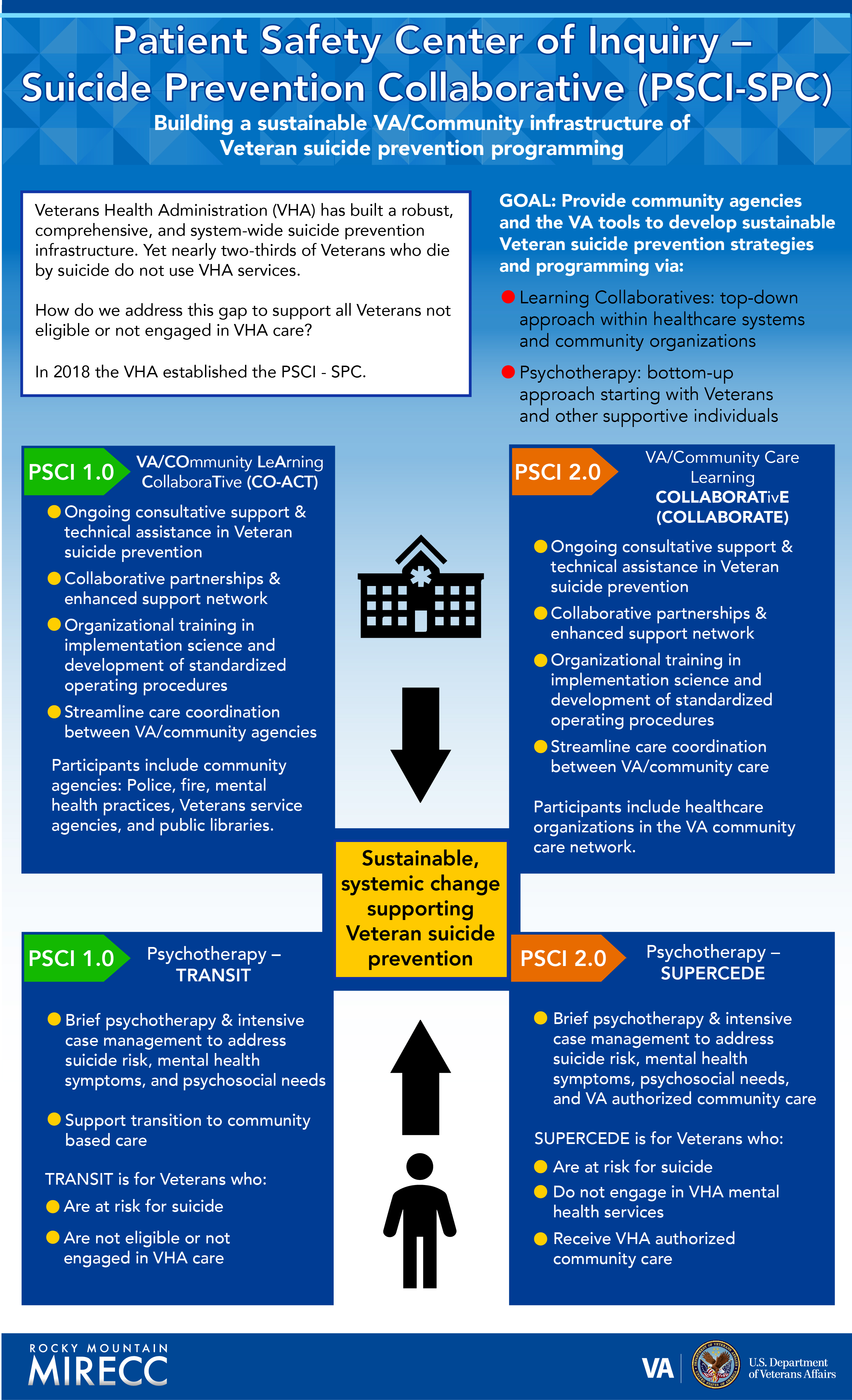MIRECC / CoE
Suicide Prevention Learning Collaborative - VA/Community Organizations
PSCI-SPC Learning Collaboratives
Learning collaboratives bring together organizations that have a shared purpose in quality improvement, and work together collectively to implement change. The PSCI-SPC organizes and facilitates learning collaboratives to create environments in community organizations and VA community care organizations that welcome Veterans, understand the needs of Veterans, and implement sustainable programs to support Veterans, particularly related to mental health and suicide prevention.
History of the Learning Collaboratives
The PSCI-SPC CO-ACT was a community based participatory research pilot conducted in 2020-2021 with 13 participating community organizations in the greater Denver/Colorado Springs, Colorado area. CO-ACT connected the VA suicide prevention research experts to community organizations to support these organizations in implementing Veteran suicide prevention practices. PSCI-SPC strove to understand the challenges organizations face in relation to Veteran suicide prevention and developed solutions to these issues. The VA/Community Learning Collaborative also sought to create a network of collaborative partnerships among members. The goal of this work was to improve suicide prevention practices for Veterans in the community and reduce Veteran suicide deaths.
To learn more about the learning collaborative model and how to implement it in your community access the CO-ACT Toolkit below:
- Link to CO-ACT Toolkit
- To learn more about the efficacy of CO-ACT, please read our article published in Suicide and Life Threatening Behavior
- DeBeer, B., Mignogna, J., Borah, E., Bryan, C., Monteith, L. L., Russell, P., Williams, M., Bongiovanni, K., Villarreal, E., Hoffmire, C., Peterson, A., Heise, J., Mohatt, N., Baack, S., Weinberg, K., Polk, M., Alverio, T., Keene, R., Mealer, M., & Benzer, J. (2023). A pilot of a veteran suicide prevention learning collaborative among community organizations: Initial results and outcomes. Suicide and Life-Threatening Behavior, 53, 628-641.
- https://doi.org/10.1111/sltb.12969
- https://onlinelibrary.wiley.com/doi/10.1111/sltb.12969
The PSCI-SPC team recognized suicide prevention gaps for Veterans enrolled in VA Community Care. The COLLABORATE worked to improve Veteran suicide prevention programming and care coordination in healthcare systems that participate in VA Community Care. COLLABORATE provided VA Community Care healthcare systems with the following: 1) ongoing consultative support and technical assistance within a quality improvement framework to enhance community healthcare systems' development of robust Veteran suicide prevention programming; (2) an environment that fostered collaborative partnerships among learning collaborative members to provide an enhance supportive network for these organizations and the Veterans they serve; and (3) connections between the VA and VA authorized community care healthcare systems in order to improve Veteran suicide prevention care coordination. Data collection is ongoing.
This learning collaborative includes multisite organizations to spread the reach of this intervention.
PSCI-SPC's research indicates that healthcare systems in the VA Community Care Network that have multiple sites need additional support in implementing Veteran suicide prevention across their enterprises. PSCI-SPC 3.0 will advance the Veteran suicide prevention organizational interventions of CO-ACT and COLLABORATE by developing and piloting a multisite Veteran suicide prevention learning collaborative with large regional or national healthcare systems in the VA Community Care Network. To accomplish this, the learning collaborative will provide technical support and assistance to implement Veteran suicide prevention programming, first focusing on establishing policies and procedures across multisite organizations and then implementing these changes across the healthcare system.
Needs expressed by VA/Community Learning Collaborative Partner Organizations and PSCI developed and other product solutions:
PSCI-SPC solution: PSCI-SPC CO-ACT Toolkit
PSCI-SPC solution: VHA Train website
PSCI-SPC solution: Link to MIRECC Suicide Risk Management Consultation Program

Patient Safety Center of Inquiry - Suicide Prevention Collaborative (PSCI-SPC)
Building a sustainable VA/Community infrastructure of Veteran suicide preventiori programming
Veterans Health Administration (VHA) has built a robust, comprehensive, and system-wide suicide prevention infrastructure. Yet nearly two-thirds of Veterans who die by suicide do not use VHA services.
How do we address this gap to support all Veterans not eligible or not engaged in VHA care?
In 2018 the VHA established the PSCI - SPC.
GOAL: Provide community agencies and the VA tools to develop sustainable Veteran suicide prevention strategies and programming via:
- Learning Collaboratives: top-down approach within healthcare systems and community organizations
- Psychotherapy: bottom-up approach starting with Veterans and other supportive individuals
Sustainable, systemic change supporting Veteran suicide prevention
PSCI 1.0
VA/Community Learning Collaborative (CO-ACT)
- Ongoing consultative support & technical assistance in Veteran suicide prevention
- Collaborative partnerships & enhanced support network
- Organizational training in implementation science and develpment of standardized operating procedures
- Streamline care coordination between VA/community agencies
Participants iinclude community agencies: Police, fire, mental health practices, Veterans services agencies, and public libaries.
Psychotherapy - TRANSIT
- Brief psychotherapy & intensive case management to address sucide risk, mental health symptoms, and psychosocial needs
- Support transition to community based care
TRANSIT is for Veterans who:
- Are at risk for sucide
- Are not eligible or not engaged in VHA care
PSCI 2.0
VA/Community Care Learning COLLABORATIVE (COLLABORATE)
- Ongoing consultative support & technical assistance in Veteran sucide prevention
- Collaborative partnerships & enhanced support network
- Organizational training in implementation science and development of standardized operatiing procedures
- Streamline care coordination between VA/community care
Participants include healthcare organization in the VA community care network.
Psychotherapy - SUPERCEDE
- Brief psychotherapy & intensive case management to address sucude risk, mental health symptoms, psychosocial needs, and VA authorized community care
SUPERCEDE is for Veterans who:
- Are at risk for suicide
- Do not engage in VHA mental health services
- Recieve VHA authorized community care



















